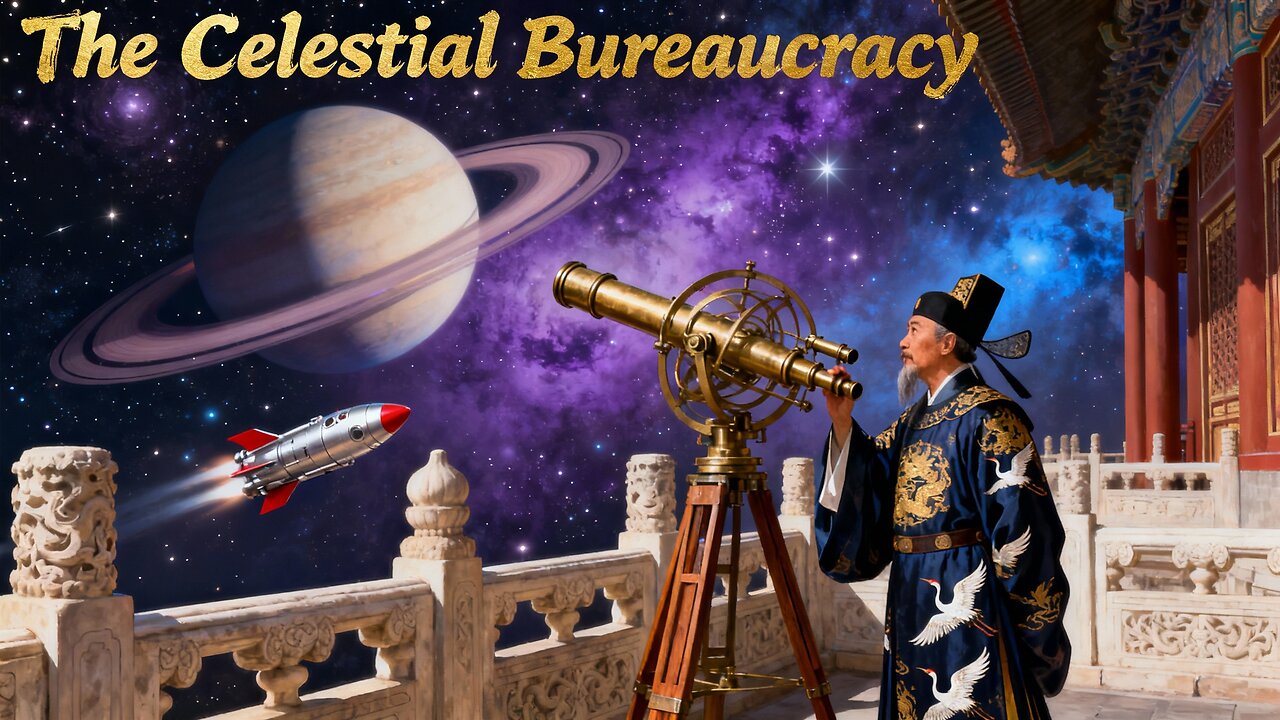Premium Only Content

The Celestial Bureaucracy: China's Space Administration in the 1600s
🚨 FORGET TELESCOPES—THEY HAD A SPACE ADMINISTRATION! 🚨 While Europe was emerging from the Dark Ages, the Ming Dynasty was running a state-funded, multi-department agency whose sole job was to monitor, predict, and control the cosmos.
On this episode of Pastpulse, we're diving into one of history's most sophisticated scientific endeavors: The Chinese Celestial Bureaucracy. This wasn't just stargazing; it was a matter of life, death, and imperial power. The Emperor's right to rule came directly from the stars, and the astronomers of the Qintianjian bureau were the ones keeping him in power.
WE'RE UNPACKING THE COSMIC SECRETS OF THE MING DYNASTY:
👑 The Mandate of Heaven: How a single astronomical mistake—a missed eclipse or unpredicted comet—could cost the Emperor his throne and an astronomer his head. This was science with the highest possible stakes.
🏛️ The Qintianjian HQ: Inside the world's first "NASA"—a massive, state-sponsored institute of mathematicians, engineers, and scholars mapping the heavens with insane precision.
🌒 The Tools of the Trade: Explore the incredible observatories, armillary spheres, and celestial globes that were centuries ahead of their time.
⚔️ The Jesuit Infiltration: How European missionaries like Matteo Ricci infiltrated the Bureau, not with armies, but with advanced math and astronomy, in a secret war for scientific and political influence.
This is the story of how an empire tried to bureaucratize the heavens, proving that the drive to understand the universe is a power that has shaped human history for millennia.
If you think space exploration started with Sputnik, you're 400 years late. SMASH THAT LIKE BUTTON & SUBSCRIBE to Pastpulse for more mind-blowing histories!
Could a modern government survive if its legitimacy was tied to predicting the stars? What other ancient "space programs" have we forgotten? SOUND OFF IN THE COMMENTS! 👇
-
 1:31:18
1:31:18
Graham Allen
2 hours agoErika Fights Back: Vows To EXPOSE TRUTH & DEMANDS Trial Goes Public!! Left Says Her Grief Is FAKE!
89.6K63 -
 LIVE
LIVE
Badlands Media
6 hours agoBadlands Daily: November 3, 2025
3,681 watching -
 LIVE
LIVE
Wendy Bell Radio
5 hours agoThings Will Get Worse Before They Get Better
7,880 watching -
 1:08:17
1:08:17
Chad Prather
9 hours agoHow to Get Along With People You Don’t Even Like (Most of the Time)
68.6K16 -
 1:45:29
1:45:29
MTNTOUGH Podcast w/ Dustin Diefenderfer
8 hours agoTaya + Colton Kyle: Can American Marriages Survive 2025? | MTNPOD #140
4.78K -
 1:12:23
1:12:23
The Bold Lib
16 hours agoSay Something Beyond W/MikeMac: JOKER - Ep.12
5.42K -
 LIVE
LIVE
LFA TV
16 hours agoLIVE & BREAKING NEWS! | MONDAY 11/3/25
3,010 watching -
 1:30:13
1:30:13
Game On!
14 hours ago $10.41 earnedChiefs Dynasty OVER, New Longest FG RECORD, and Patriots Are Winning The Super Bowl!
29.5K2 -
 4:02:17
4:02:17
The Bubba Army
3 days agoIS AMERICA OVER TRUMP? - Bubba the Love Sponge® Show | 11/03/25
90.6K30 -
 48:57
48:57
Man in America
19 hours agoThe Sinister Reason They Put Fluoride in Everything w/ Larry Oberheu
373K107